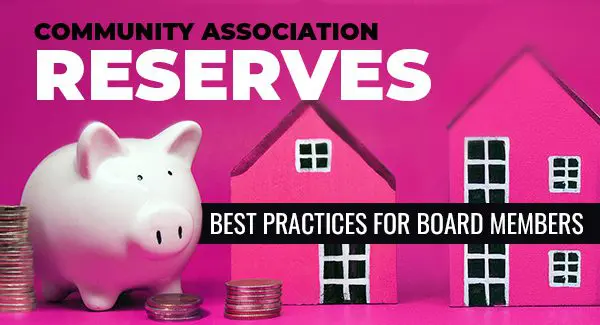- Community Associations, Board Member 101
- Wisconsin, Indiana, Illinois, Florida
Condominium, homeowner (HOA) and townhome community associations typically operate on an annual budget that covers day-to-day operations and planned maintenance. This budget accounts for regular expenses, including:
- Common area upkeep (ex. landscaping, parking lot, lighting)
- Utilities (ex. water, electricity, waste disposal, recycling)
- Association amenities (ex. swimming pool, fitness center)
- Insurance (ex. property, liability, workers compensation, directors and officers)
- Professional services (ex. property management, accountant, attorney)
However, associations must also plan for larger, less frequent expenses, such as roof replacements or road repairs. This is where reserve funds come into play. Reserve funds are specifically allocated for major repairs, replacements, and unexpected expenses that extend beyond the scope of routine association maintenance.
Reserve Spending: Five Uses for Community Association Funds
While each community’s needs are unique, below are five common ways that associations typically use their reserves.
1. Emergency Repairs Beyond the Planned Budget – Emergencies such as storm damage, plumbing failures, or HVAC breakdowns can require immediate action and funding. When the operational budget cannot cover the full cost of these emergencies, reserves can be tapped to fund critical community association repairs.
2. Expenses Beyond Budgeted Amounts – The actual cost of planned maintenance or repair projects can exceed the association’s budget. This could be due to fluctuating material costs, labor shortages, or unexpected complexities during a project. In these cases, reserve funds can help cover the gap without impacting the association’s regular services or assessments.
3. Capital Improvement Projects – Reserve funds are often used for planned capital improvement projects such as resurfacing roads, replacing roofs, or upgrading shared amenities like pools or clubhouses. These are high-cost projects that do not occur annually but are necessary to maintain the community’s infrastructure and property values.
4. Litigation Expenses – Although not ideal, associations sometimes find themselves facing lawsuits that incur legal costs. If these expenses are not covered by insurance or legal defense, reserves may be necessary to pay for unbudgeted legal fees or settlements.
5. Preventive Maintenance and Upgrades – Reserve funds can be used for preventive maintenance that extends the life of community assets. For example, funds might be used to seal cracks in pavement, preventing the need for a more costly replacement down the road.
Managing Reserve Funds: Five Board Member Best Practices
Effective management of reserve funds is one of the most important fiduciary duties of an association’s board of directors. Below are a few best practices that can help ensure that reserves are adequately funded and properly utilized.
1. Conduct a Reserve Study – A reserve study is a proactive, professional assessment of the long-term repair and replacement costs for community assets. Boards should ensure that a reserve study is updated as needed. This helps maintain accurate projections of future expenses and ensures that the association’s reserve account is adequately funded.
2. Follow a Reserve Funding Plan – Board members should develop and adhere to a reserve funding plan that ensures steady contributions to the reserve account. This may involve calculating a percentage of the annual budget to ensure that reserves are fully funded.
3. Ensure Transparency and Accountability – Board members should maintain transparent communication with homeowners about the association’s reserve funds. Clear, consistent reporting builds trust and demonstrates that the board is fulfilling its fiduciary responsibilities.
4. Avoid Using Reserves for Non-Essential Expenses – Reserve funds should not be used for regular operating expenses or non-essential projects. Boards should remain disciplined and ensure that reserves are reserved for their intended purpose such as large-scale repairs, replacements, and emergencies.
5. Plan for Long-Term Financial Health – By consistently contributing to reserves and keeping an eye on future needs, boards can avoid special assessments or loans to cover unexpected association costs. Proper planning ensures the association’s long-term financial health and stability, protecting both the community and its members.
Legal Resource
When managing a community association, reserves are a vital part of a community association’s financial health. Understanding how reserves fit into the overall budget and properly utilizing the reserves ensures that the association can handle unforeseen expenses and long-term capital projects. Reserve planning not only supports the immediate needs of the community but also preserves property values and enhances the quality of life for all residents.
Questions about community association reserves, special assessments, or other legal requirements? Do not hesitate to call 855-537-0500 or visit www.ksnlaw.com.
Since 1983, KSN has been a legal resource for condominium, homeowner, and townhome associations. Additionally, we represent clients in real estate transactions, collections, landlord/tenant issues, and property tax appeals. We represent thousands of clients and community associations throughout the US with offices in several states including Florida, Illinois, Indiana, and Wisconsin.
Please note the material contained in this article is for educational and informational purposes only and does not constitute legal advice. No attorney-client relationship is established by your review or receipt of the information contained in this article. You should not act on the information discussed in this article without first obtaining legal advice from an attorney duly licensed to practice law in your State. While KSN has made every effort to include up-to-date information in this article, the law can change quickly. Accordingly, please understand that information discussed in this article may not yet reflect the most recent legal developments. Material is not guaranteed to be correct, complete, or up to date. KSN reserves the right to revise or update the information and statements of law discussed in the article law at any time, without notice, and disclaims any liability for your use of information or statements of law discussed on the article, or the accessibility of the article generally. This article may be considered advertising in some jurisdictions under applicable law/s and/or ethical rules/regulations. © 2025 Kovitz Shifrin Nesbit, A Professional Corporation.


